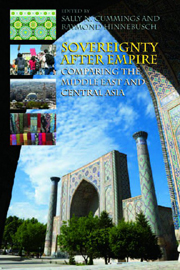Book contents
- Frontmatter
- Contents
- Acknowledgments
- Notes on the Contributors
- 1 Introduction
- SECTION I Histories of Empire and After
- 2 Russian Empires
- 3 The British and French Empires in the Arab World: Some Problems of Colonial State-formation and its Legacy
- 4 Ottoman Legacies and Economic Sovereignty in Post-imperial Anatolia, Syria and Iraq
- SECTION II Paths to Sovereignty: Views from the Core and Periphery
- SECTION III Empire and Domestic Sovereignty
- SECTION IV Empire and Popular Sovereignty
- SECTION V Empire and External Sovereignty
- Bibliography
- Index
2 - Russian Empires
from SECTION I - Histories of Empire and After
Published online by Cambridge University Press: 12 September 2012
- Frontmatter
- Contents
- Acknowledgments
- Notes on the Contributors
- 1 Introduction
- SECTION I Histories of Empire and After
- 2 Russian Empires
- 3 The British and French Empires in the Arab World: Some Problems of Colonial State-formation and its Legacy
- 4 Ottoman Legacies and Economic Sovereignty in Post-imperial Anatolia, Syria and Iraq
- SECTION II Paths to Sovereignty: Views from the Core and Periphery
- SECTION III Empire and Domestic Sovereignty
- SECTION IV Empire and Popular Sovereignty
- SECTION V Empire and External Sovereignty
- Bibliography
- Index
Summary
No definition of empire fits all empires which have existed in history, or even all the most important ones. Since most great empires evolve over time and differ greatly between regions, one definition of empire is often hard pressed to encompass the key elements of even a single actual empire. For example, what definition of empire adequately encapsulates London's relationship with the seventeenth-century West Indies, eighteenth- century India, nineteenth-century Ireland and Africa and the early twentieth-century White Dominions?
When one moves beyond the domestic constitution of empire to empire's place in international relations, similar problems of definition occur. Empire is often seen, for example, as the antithesis of multi-polarity. Post-Westphalian Europe is contrasted to the regional hegemony exercised by Rome in western Eurasia or the Chinese empire in the east. But in reality Rome had to negotiate with the massive power of imperial Persia, and Chinese dynasties conducted two millennia of diplomacy with their northern neighbors, often very consciously from a position of weakness. Moreover, in nineteenth-century Europe when Westphalian principles ruled supreme, most of the key players in the European concert called themselves, and by most definitions were, empires. From this I draw the conclusion that there are no correct definitions of empire, merely more or less useful ones. A definition will depend on what aspects of empire interest a scholar and its usefulness will be disputed by other scholars in part because they may or may not share an interest in these aspects.
- Type
- Chapter
- Information
- Sovereignty after EmpireComparing the Middle East and Central Asia, pp. 25 - 43Publisher: Edinburgh University PressPrint publication year: 2011

